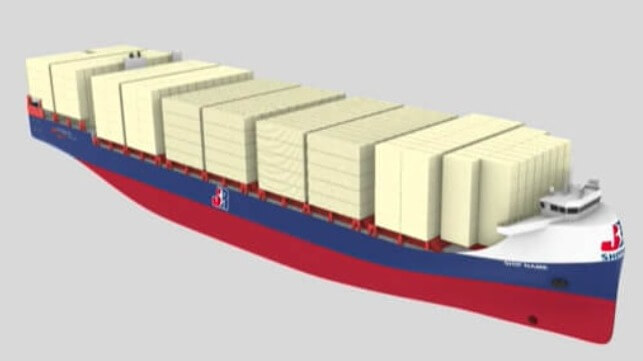Next Generation of ECO Feeders to Meet Market Needs

Dutch shipowner JR Shipping Group is working with German ship designer Technolog for the development of a new series of feeder vessels designed to meet the growing needs of the market. With feeders being one of the fastest-growing market segments, the companies are working to produce new designs that offer more capabilities, are far less fuel consumption, produce far less emissions and create better economics in the long run.
“The market needs a new generation of better performing and more sustainable feeder vessels,” says Managing Owner Sander Schakelaar. “We strongly believe in the need for a more integrated approach with our clients in order to achieve their goals.”
Working on the concepts since 2019, the companies are now presenting their designs for a future generation of sustainable container feeder vessels, the ECO Feeders. The main goal is to maximize energy efficiency and economic performance while also minimizing the climate footprint.
The series of new designs cover all segments of the European container feeder market. The ECO Flex Feeders range from 500, 900, and 1100 TEU capacity with high 45-foot container capacities. The design for the Baltic Max ECO Feeders ranges from 1600 TEU up to 2100 TEU capacity. All designs will have the highest ice class.
“We are at the dawn of a new era,” says Schakelaar. “Enabled by growing container volumes and technological advancement and necessitated by increasing environment requirements a new generation of feeder vessels is inevitably knocking on the door.” He explains that the new ECO vessels will be based on principles such as hull form optimization for actual operational speed profiles, focus on optimizing energy efficiency, extreme reduction of fuel consumption and emissions, and focus on reducing operational costs.
The ECO vessels will initially be fueled with ultra-low sulfur fuel oils while applying additional exhaust gas filtering including Carbon Capture to minimize the carbon footprint. However, the vessels will be prepared to switch to other sustainable fuels at a later stage such as green methanol or synthetic LNG. The Reduction of fuel consumption could be 40-50 percent.
JR Shipping Group reports that it is currently discussing its new designs with several clients/charterers to jointly move forward. Selected designs will then be customized to the needs of these and any other interested charterers. JR Shipping will continue to involve its clients/charterers closely in the development of the ECO Feeder designs.
